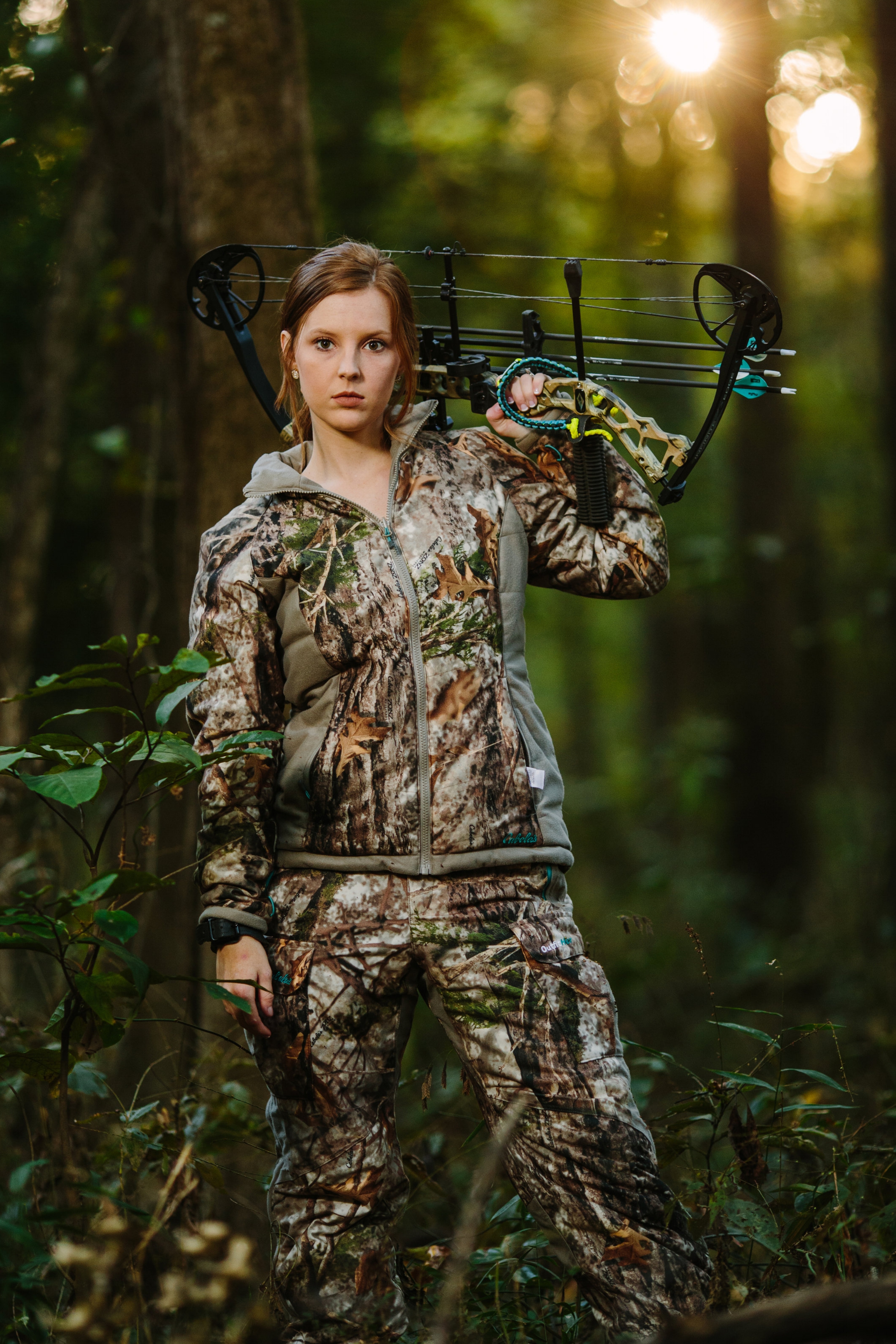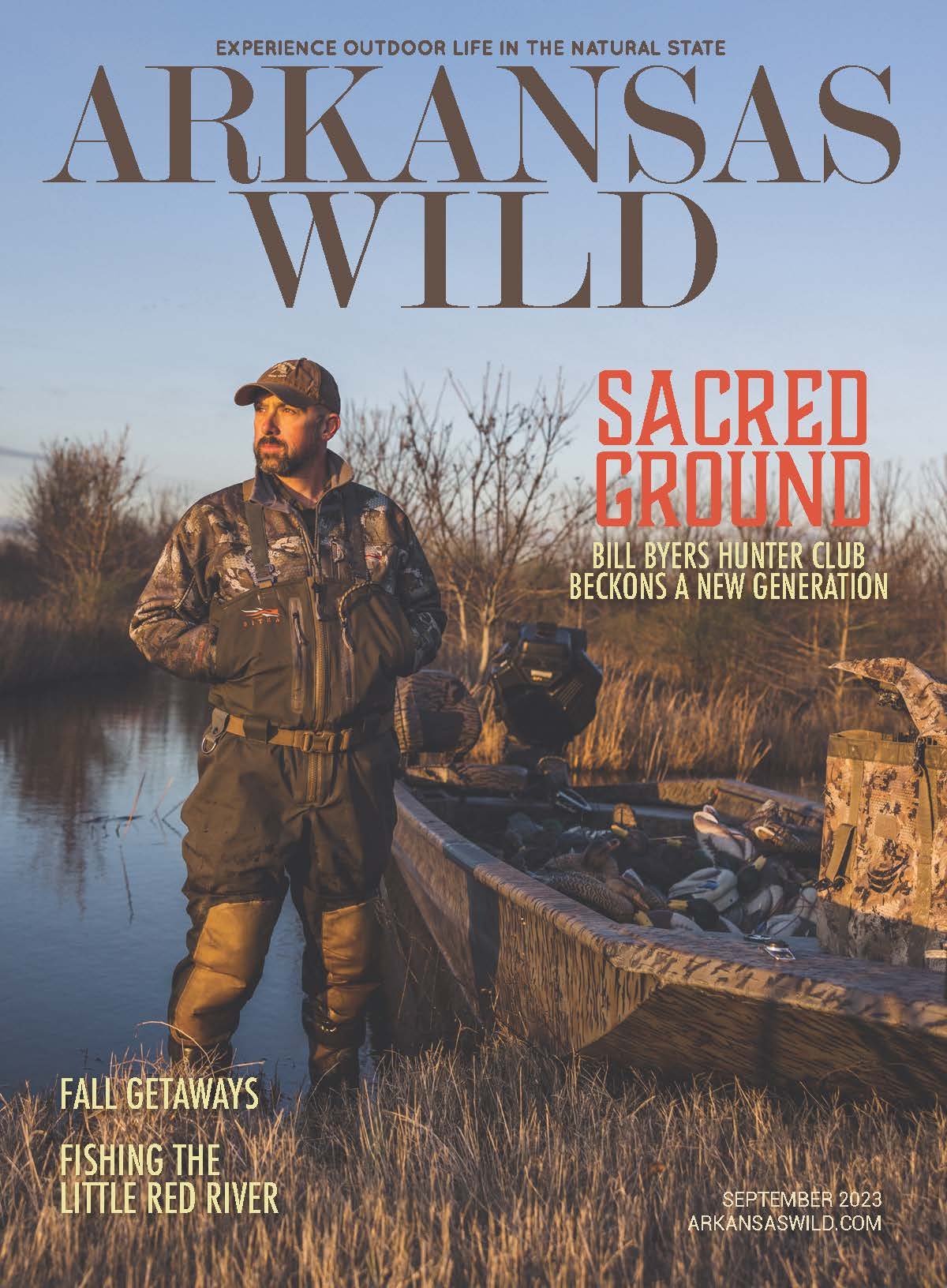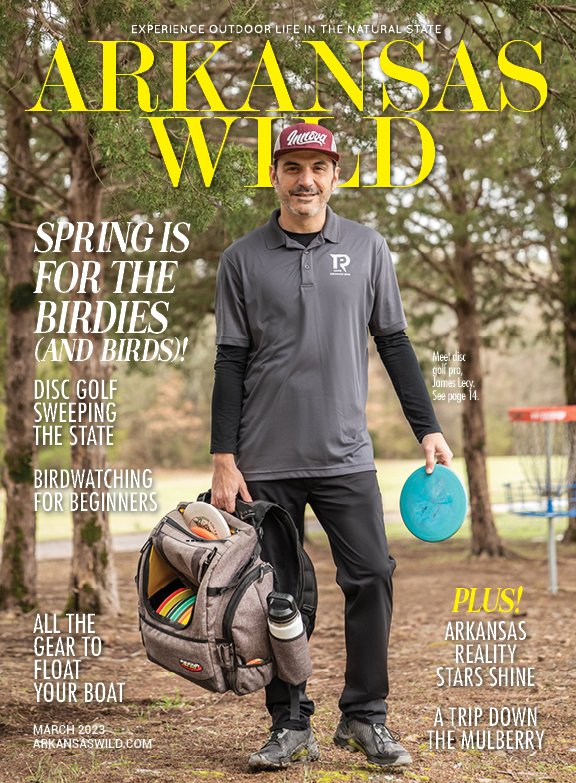This year’s Young Guns are nominated for their efforts in advocacy, sustainability and the advancement of participation in the outdoors. Some of our Young Guns spend all their free time outside, while others also work outdoors. Regardless of how they contribute to the Arkansas wild, they’ve got one thing in common—they’re people to keep an eye on.
By Lacey Thacker
Photo by Brian Chilson
Zach Meyer
Zach was started on shooting sports at the tender age of three, when he began shooting a bow. A shotgun followed at age five, when he began hunting turkey and deer. By age nine he was shooting competitively. A native of Heber Springs, Zach isn’t the only family member to participate in the sport—his younger brother, Nick, also competes.
Zach participates in YHEC, the Youth Hunter Education Challenge of the NRA. YHEC has chapters across the state that come together for a yearly competition of around 400 people. This year, Zach won in his category of 13-to-18 year olds, becoming the Senior Grand Champion. That’s a huge part of what keeps Zach coming back year after year—the competition. “I’m very competitive,” Zach says.
Competitive he may be, but he’s not strictly interested in competition for competition’s sake. Instead of focusing only on marksmanship, YHEC competitions also include tests over various areas of hunting knowledge and general wildlife identification. In many ways, Zach says, YHEC is so excellent because it’s really training participants to be better, safer hunters. He began in Cleburne County’s chapter, but now attends Hendrix College in Faulkner County. Because he’s coming to the end of his eligibility for participation, Zach has become a coach in the Faulkner County chapter. As we’re chatting, Zach explains to me that wind speed, temperature, even the Coriolis effect—the spin of the earth—come in to play when calculating where to aim when taking a shot. When I point out what high-level calculations those really are, he says, “Oh, I’ve actually got an app on my phone that syncs with the closest weather station to help make those calculations.” Of course, it doesn’t hurt that he’s a physics major.
But not every weapon requires such heavy calculations. Take the spear, for example. Zach recently acquired his first, and he’s rigged a system at home so he can throw it from the roof to practice his aim. “It’s heavier than you’d think,” Zach says, noting that he hasn’t had the chance to throw it on a hunt yet, but he’s hoping the right deer will come along soon.
When he’s not shooting, Zach enjoys rock climbing, a common sport for young people, but he also regularly makes the drive to Little Rock to enjoy the variety of plays performed there.
Photo by Novo Studio
Paxton Roberts
Paxton Roberts, executive director of Bike NWA, had always wanted to volunteer, but after volunteering in several roles, he still hadn’t found the one that seemed a good long-term fit. It was when he saw a call from Bicycle Coalition of the Ozarks for volunteers to fit children with bike helmets at local elementary schools that he found his niche. It was his first real experience with bike advocacy, and after an hour fitting children with helmets, he realized this was his path. His daughter was barely in elementary school herself at the time, and he knew he wanted to do what he could to create a safer place for her and other children to ride their bikes to school. He was working on a PhD in public policy at the time, and he focused his studies on active transportation, infrastructure and cycling advocacy.
Sam Slaton, director of communications for Bike NWA, noted that there is a lot of good to say about Paxton. According to Sam, he is “the bike advocate that Northwest Arkansas needs to become a world-class place to live.” Not only is Paxton incredibly knowledgeable about bike advocacy, he also makes bike advocacy fun, and he does that while building great relationships among people in the community. Slaton says further, “I don’t know a more dedicated bike advocate. He has served the Northwest Arkansas biking community as a volunteer for years. He did so on top of pursing a PhD, working full time and being a dad. It’s a huge blessing to the Northwest Arkansas bike community that he’s now able to devote his energy to this full time.”
Paxton loves cycling, and that energy is clear when you speak with him. Much of what his job entails is “reconnecting people with something that most people, at their core, love to do.”
Paxton grew up riding a bike, but switched to a car when he turned 16. He rediscovered mountain biking in college, when he would frequently ride at Devil’s Den. Today, he says, “When I’m not working, riding bikes or talking about bikes, I love the outdoors.” He can often be found in the Buffalo River area, where he paddles, climbs and hikes. He’s excited that not only is Arkansas becoming a well-known destination for mountain biking, it’s also becoming a world-class rock climbing destination.
Photo by Novo Studio
Cortnie Been
“I have learned a lot about myself,” says Cortnie Been, lifelong Arkansas resident and Huntress View team member, on what she has learned from hunting. “I have learned to be persistent, to be patient, and how to deal with frustrations when the hunt just doesn't pan out. Hunting is humbling, and, many times, the things you learn can be applied in other life situations.”
Huntress View is a team of women hunters dedicated to introducing women and children to hunting and the outdoors. “Huntress View has given me more confidence in myself and has encouraged me to share more of my experiences with others,” Cortnie says of being a Huntress View team member. “I have learned from many of the women on the team. I have had several people ask what Huntress View is about which gives me an opportunity to share with them the goals of HV and opens doors to share other aspects of hunting with them as well.”
Currently working on a Doctorate of Pharmacy at the University of Arkansas for Medical Sciences, Cortnie stays very busy with studying. But when asked how she finds time to fit in both school and hunting, Cortnie replied, “Hunting is something I don't think I will ever get out of my system. One of my favorite study breaks is shooting my bow and it wouldn't be unusual to find me studying in the deer stand on those weekends when there just isn't enough time to do both separately.”
““Hunting is something I don’t think I will ever get out of my system.””
This past duck season, Cortnie was determined to shoot and hopefully mount a drake wood duck. The morning after completing her final exams, she went on a hunt. It was just past shooting light, and a single wood duck made his way in about fifteen yards from the tree she was standing beside. As he got up to fly off, I knocked him down with one shot. “Not only was it my first wood duck, but it was also the first duck the dog we had with us got to retrieve in her career which made it even more special.”
Cortnie advises others who are thinking of going hunting for the first time to be persistent and stay positive. “Don't give up. Don't give up on yourself or your abilities,” she says. “Don't give up on that buck that keeps showing up on camera or those birds you just can't seem to call in. Step back and take a look at your approach, readjust and go again.” —Andrea Haas
Photo by Novo Studio
Trevor Freemyer
Trevor Freemeyer grew up hunting alongside his father, uncle and grandfather at their duck camp in Almyra, Arkansas. Today he still spends as much time as possible there and brings friends from all over the country out for hunts.
In college, he was the president of his fraternity, Kappa Sigma, Xi chapter, at the University of Arkansas. He graduated with a degree in agriculture business, which he soon put to work for Riceland Foods as the sustainability coordinator. In that position, he worked alongside Ducks Unlimited and the National Resources Conservation Service to develop sustainable and innovative conservation programs designed to address the needs of rice farmers while increasing the financial assistance provided for the implementation plan of these practices. He still works with Riceland, but through Best Rice, as director of sales and marketing. His wife, Brooke, says Trevor is passionate about working with farmers to continue feeding people in the most efficient way possible, while still helping “preserve as much of wildlife and natural systems” as he can.
In addition to being a passionate advocate for the outdoors in his career, he’s also an avid outdoorsman in his time off. He and his wife deer hunt together every year, and she says, “It’s a little healthy competition between us, to see who’ll get the biggest deer every year.” And that’s not the only hunting he does—Brooke notes that, “He’s a crazy duck hunter. He’s basically gone from bow season to the end of duck season. He’s outside all the time.” And when Trevor isn’t able to hunt, Brooke says he can be found fishing or even just hanging out at his family’s duck camp.
Photo by Novo Studio
JESS & LAURA WESTBROOK
Jess and Laura met in college. “I said, ‘Hey, girl,’” Jess comments, teasingly tipping his chin toward his wife. Laura laughs and says it took a bit more than that, but she did wind up saying yes to a date and eventually yes to marriage. Though Laura enjoyed fishing, it wasn’t until she and Jess started dating that she tried her hand at fly fishing. Today she’s as avid a fisherman as any. Jess, fishing since he was eight years old, actually spent his summers in college guiding in Alaska.
When their oldest child, now three years old, was a newborn, Jess started experiencing intense anxiety. It would disappear when he went out on the water, because, as he says, “All I cared about was catching fish.”
It got Jess thinking about all the stress and anxiety foster kids experience. The Mayfly Project was born, and their first official outing took place in July of 2016. It’s already expanded into eight states, where volunteers commit to five fly fishing outings with the same group of kids over the course of six months. Recently, The Mayfly Project has been able to make and share videos of a couple of kids that have resulted in successful adoptions. “We thought we’d just take them out and have fun, but now that they’re getting adopted…I have chills!” Laura says.
Their commitment extends to major life choices—Jess left his job as a controller for a large construction company to work at local clothing company Nativ, allowing him more time and flexibility to devote to Mayfly. Between Jess’ work as an accountant and Laura’s familiarity with navigating procedural issues, Jess says, “We’ve pretty well got administration covered.”
The Mayfly Project has become their primary “hobby,” taking up most evenings and frequent weekends. The couple says the project is all the better for their shared participation. Jess still guides—and all his tips go to Mayfly. “I don’t ever want to take a salary from Mayfly,” he says, as the couple want the Project to remain about love for foster kids and passion for the work.
And their own children? Laura says they take them, on The Mayfly Project outings, and they encourage their mentors to do the same. Aside from the family-friendly nature of fishing, Laura comments that it’s also positive for foster kids to hang out with a healthy family dynamic.
Jess and Laura Westbrook are big-hearted individuals already making great strides in the lives of kids across Arkansas and several other states.
Photo by Novo Studio
Cate Davis
At first glance, one might not size up Cate Davis of Little Rock as an outdoor enthusiast, much less a whitewater kayaker. Small in stature with a serene personality, she often finds herself in stark contrast to the stereotypical thrill-seeking kayaker. But, while in college at Louisiana Tech, Cate spent three summers working in Tennessee as a raft guide on the class III and IV Ocoee river. There she was introduced to kayaking, but it was a move to Arkansas in 2009 that jump-started her as a more serious paddler.
New to Arkansas and in need of new friends, she discovered the Rockport Whitewater Park on the Ouachita River near Malvern. There Cate met other kayakers who quickly suggested she join the Arkansas Canoe Club. She showed up soon thereafter at the ACC’s Surf & Turf event and the hook was set. Cate said that during this event she simply went around introducing herself and casually mentioning that she had been “a raft guide on the Ocoee.” In short order, she found herself in a raft with some veteran Arkansas paddlers intentionally attempting to stick the raft in a sketchy hydraulic just because they could.
Her co-workers have even learned to sense when she’s been kayaking. They say it’s as if she won the lottery but is keeping it secret. She says the skills she has learned kayaking also help her professionally, as she is now more apt to take on reasonable challenges and calculated risks.
As is often the case, Cate’s personal and recreational life collided too. She met her fiancé Chris Handley at an ACC event and the two have been negotiating life in tandem ever since. Cate was elected president of the club’s Central Chapter in April of 2016. As president, Cate has been a strong advocate for cleaning up Arkansas waterways. She has spent many hours teaming with friends to significantly reduce the amount of trash in and around our streams. She also has shaken up chapter activities a bit such as holding chapter meetings outdoors and combining meetings with other fun activities. Cate also hopes to bring back a chapter-sponsored introduction to paddling event.
Cate has three suggestions for anyone interested in kayaking: 1. Find trusted paddling partners 2. Take formal paddling instruction from qualified instructors, such as the instruction found at the ACC’s Schools of Whitewater and River Paddling. 3. Acquire appropriate gear. She says before you know it, what seemed impossible at first “doesn’t feel crazy” anymore. —Gordon Kumpuris









